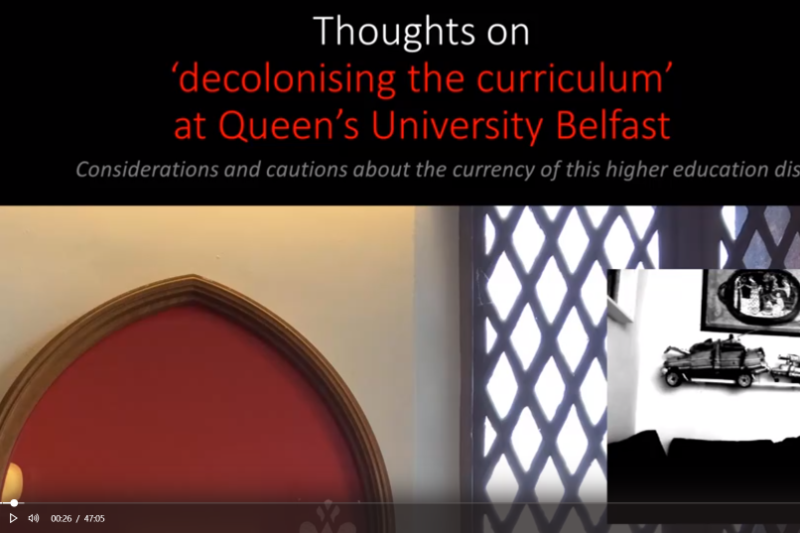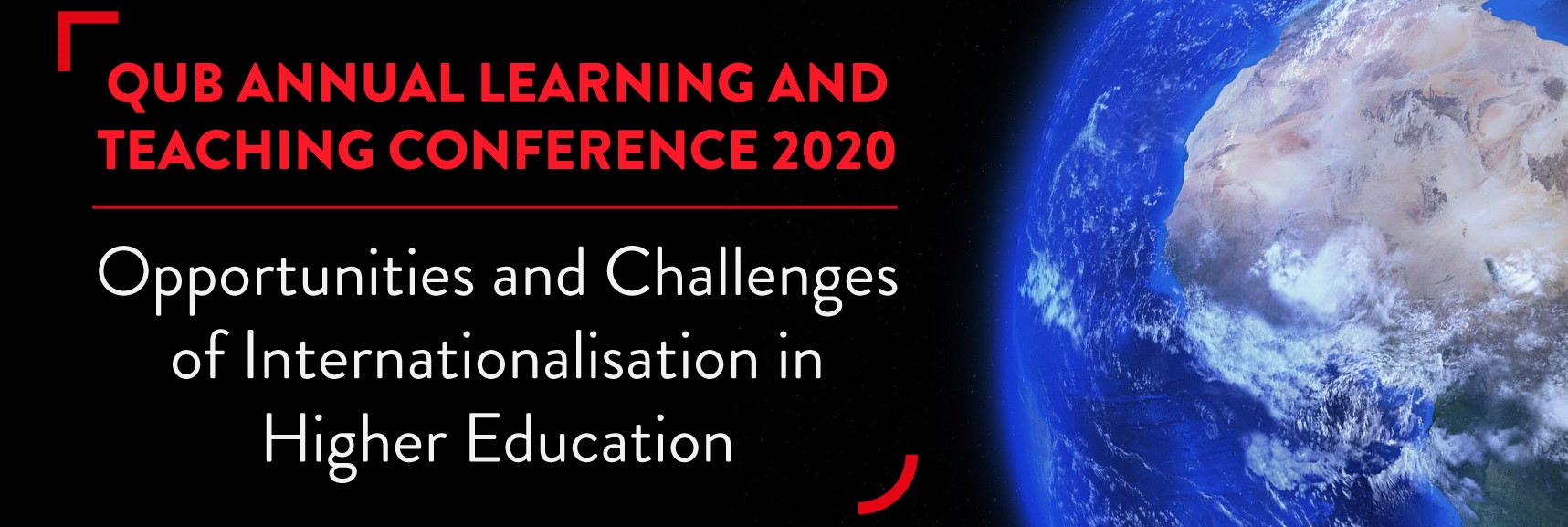
Due to the current circumstances, the #QUBLTC2020 will be rescheduled later in the Academic Year 20/21.
2 September 2020 in Ashby Building
Live stream via Mediasite, link available 2 September 10am.
#QUBLTC2020
PROGRAMME
| 9.30 - 10.00 |
Registration Foyer, Ashby Building Poster viewing, Foyer, Ashby Building Stalls, Foyer, Ashby Building |
| 10.00 - 11.05 |
Welcome Sir Bernard Crossland Lecture Theatre, Ashby Building Keynote: Dr Douglas Proctor, University College Dublin Sir Bernard Crossland Lecture Theatre, Ashby Building |
| 11.05-11.50 |
Tea/Coffee Foyer, Ashby Building Poster viewing, Foyer, Ashby Building Stalls, Foyer, Ashby Building |
| 11.50 - 12.50 |
QUB Science Shop CIRCLET Project Launch Sir Bernard Crossland Lecture Theatre, Ashby Building Short talks Sir Bernard Crossland Lecture Theatre, Ashby Building |
| 12.50 - 13.50 |
Lunch Foyer, Ashby Building Stalls, Foyer, Ashby Building |
| 13.50 - 15.00 |
Workshops: Workshop 1: Engaging students in research with communities – International Perspectives 02.022, Ashby Building Workshop 2: Internationalisation of the Curriculum 04.005, Ashby Building Workshop 3: Developing criticality in postgraduate students 02.021, Ashby Building Workshop 4: Decolonising the University: A Practical Approach 02.013, Ashby Building |
| 15.00 - 15.50 |
Panel Session Sir Bernard Crossland Lecture Theatre, Ashby Building |
If you have any special dietary or access requirements, please email ced@qub.ac.uk
Audience questions will be facilitated via Mentimeter. Download the app for Android or Apple or simply go to menti.com.
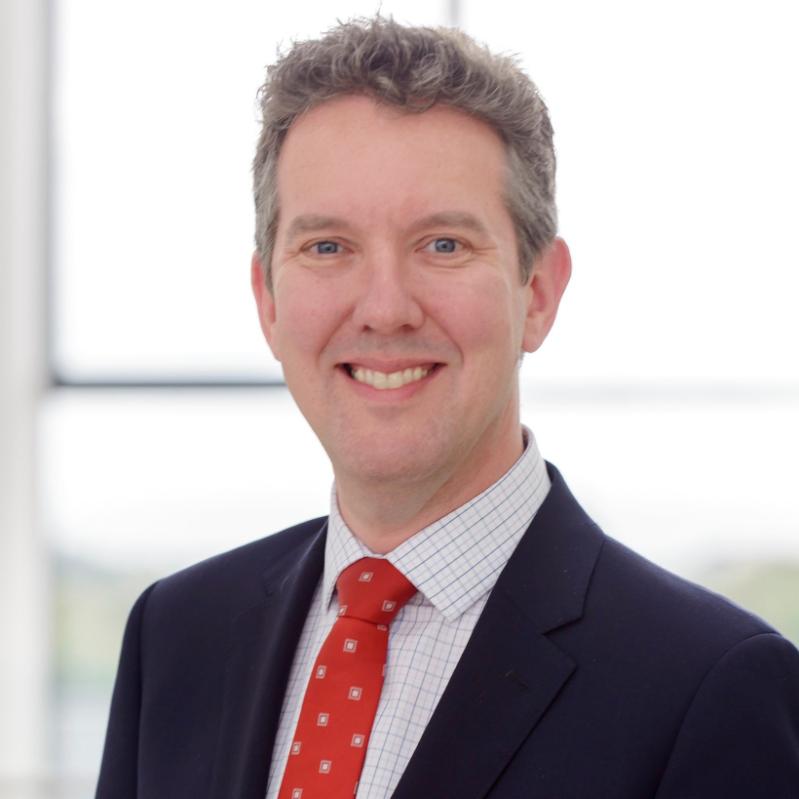
Douglas Proctor is Director, UCD Global at University College Dublin (Ireland), where he has management responsibility for the international office and provides leadership to the broader university community on internationalisation, global engagement and international partnerships. A scholar-practitioner in international higher education, Douglas completed a PhD at the Melbourne Centre for the Study of Higher Education (University of Melbourne) in late 2016. His doctoral research investigated the ways in which internationalisation has influenced the international dimensions of academic work in Australia.
Douglas has authored papers and reports in relation to his doctoral research, as well as on the global landscape of international education research. With Laura Rumbley from Boston College's Center for International Higher Education, he is co-editor of a Routledge book entitled “The Future Agenda for Internationalization in Higher Education” which offers new perspectives from a younger generation of scholars and practitioners on the future of internationalization in higher education.
Douglas is Chair of the EAIE Publications Committee and has edited recent EAIE Forum magazines on the topics of the evolving classroom and Brexit.
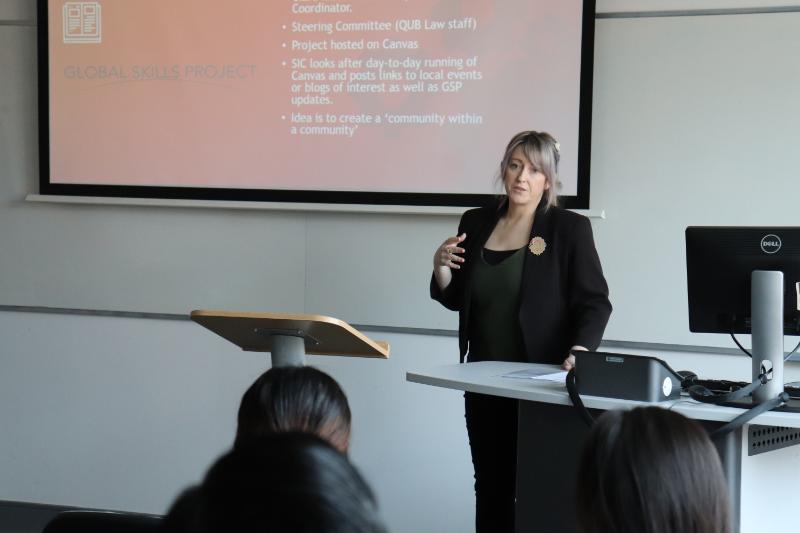
Mairead Boohan, School of Medicine, Dentistry and Biomedical Sciences, QUB
Tara Brooks and Carmen Ortiz Granero, School of Natural and Built Environment, QUB 'An integrative and collaborative approach to internationalisation in a Construction and Project Management Masters Programme '
Dr Ben Harper, The Graduate School, QUB 'Developing a community of learners in domestic and international students via Peer Proofreading'
Dr Taher Hatahet, School of Pharmacy - China Queen's College, QUB 'Content reorientation, teaching technologies and extracurricular initiatives introduced to support BSc Pharmaceutical Sciences/Biotechnology students in China Queen’s College'

Dr Emma McKenna, Science Shop, Queen's University Belfast
Workshop Learning Outcomes
By the end of this session, delegates will be able to:
- Understand both the local and international context for Community Engaged Research and Learning (CERL);
- Analyse the suitability of opportunities offered through the CIRCLET project for your own module or course;
- Evaluate your own interest in and suitability for participation in either a CPD module or Learning Circle.
This workshop will draw on the experiences of the International Living Knowledge Network and of EC-funded projects PERARES and EnRRICH and will inform the development of the CIRCLET Erasmus+ project which is being led by QUB Science Shop. The workshop will give examples of how modules in Queen’s incorporate Community Engaged Research and Learning (CERL) and the benefits of this approach for students, communities and academics. Participants will have the chance to reflect on their own teaching and learning responsibilities, and to explore whether they would like to be involved in the CIRCLET project, either through an accredited online CPD module or through a cross-disciplinary Learning Circle to offer peer support in reworking modules to include CERL.
Involvement in CIRCLET can help you to:
- Build your local and international network;
- Offer your students a real-world authentic learning experience;
- Generate societal impact and address the Sustainable Development Goals at a local level;
- Explore how to best use educational technology to support community engagement;
- Enhance your skills and CV through peer learning.
Those who successfully complete either the CPD module or the Learning Circle can apply for implementation or dissemination funding. Project participants can also apply for funding to participate in an international Learning Circle which will take place in Budapest in spring 2021.
| Timing | Activity | Focus |
|---|---|---|
| 10 | Group information Opening and introductions |
Understanding backgrounds and interests of participants |
| 15 | Presentation: How Science Shop supports engagement and one example of where community engagement is embedded in curricula in QUB | Getting some real-life examples of how engagement is done in QUB |
| 15 | Small group discussion | Offers a chance to consider how engagement can happen in individual modules and what resources or supports academics would need |
| 10 | Group Discussion | Feedback and key points |
| 5 | Plenary feedback |
Summary points from the group discussions and suggestions for future development |
Preparation before session
Workshop participants are encouraged to consider which of their module(s) might be suitable for students engaging with communities and if possible bring along the module handbook. Participants are welcome to view the CIRCLET website before the conference, along with all resources to encourage fruitful conversations and dialogue during the session.
If anyone requires content in more accessible formats, please contact ced@qub.ac.uk.

Tracy Galvin, Centre for Educational Development, Queen's University Belfast
Workshop Learning Outcomes
By the end of this session, delegates will be able to:
- Analyse current issues around why and how to Internationalise the Curriculum from a local to global context;
- Identify and apply different ideas, techniques around the principles of IoC into your practice;
- Evaluate your own practice in terms of inclusive teaching, learning and assessment.
Session Outline
An education at Queen’s University Belfast involves just under 2600 international community of students representing a 100 nationalities from all over the world. There are 9.5% of students from GB and the EU and 10.5% are from Non-EU countries, with an institutional target to increase that number to just under 4000 by 2021. Universities have significantly gained economically by increasing international student numbers. Unfortunately, across the UK the focus of internationalisation has mostly been on student mobility and recruitment, rather than embedding cultural diversity and intercultural competence where students learn to respect diversity, celebrate difference and are prepared to live and work in a globalised world.
Cultural diversity increases with the growing number of international students in Higher Education but only if international students are engaged with cross-cultural interaction with home students. Empirical evidence indicates that without support and the proper conditions, imposed diversity can lead to reinforcing stereotypes and increased divisiveness (Reid and Garson 2016). While there are many things that need to occur to celebrate cultural diversity for both home and international students, one such way is to internationalise the curriculum.
One of the most utilised definitions of IoC is the ‘incorporation of international, intercultural, and/or global dimensions into the content of the curriculum as well as learning outcomes, assessment tasks, teaching methods and support services of a programme of study’ (Leask 2015, p.9). However, no matter what the discipline it is an ongoing process that always needs to focus on intentional student learning. IoC is one of the strands in the Education Strategy 2016-2021 that is identified as a key factor to promote inclusivity at Queen’s and is included in our Corporate Plan 2016-2021.
The session looks at the why, how and what of IoC. The conceptual framework of IoC is viewed from where it fits within the internationalisation agenda and how it can be embedded into teaching, learning and assessment. The session ends in a discussion around how we can promote a high quality, equitable, global learning experience for all our staff and students irrespective of geographical location, educational experience or background to support the internationalisation agenda.
Session Activities and Approximate Timings
| Timing | Activity | Focus |
|---|---|---|
| 5 | Group information | Introduction to the session |
| 5 | Practical reflection exercise | What is internationalisation? |
| 5 | Padlet exercise | Why internationalisation the curriculum |
| 10 | Group information and discussion |
How to internationalise the curriculum The process of implementation |
| 5 | IoC conceptual framework | What are the different factors |
| 15 | Carousel activity of key terms | Discuss the key terms |
| 10 | Group Discussion | Summary points from the group discussions and suggestions for future development |
Preparation before session
Workshop participants are welcome to view the PPT presentation before the conference, along with all resources to encourage fruitful conversations and dialogue during the session.
A summary of any new ideas, resources and suggestions arising from the workshop will be sent to delegates after the conference.
If anyone requires content in more accessible formats, please contact ced@qub.ac.uk

Dr Ben Harper, Graduate School, Queen's University Belfast
Anne Rowan, Queen's Management School, Queen's University Belfast
Workshop Learning Outcomes
By the end of this session, delegates will be able to:
- Examine possible cultural differences in critical thinking in teaching and research;
- Develop an awareness of strategies to increase critical thinking for research students;
- Apply strategies to promote critical thinking in teaching and research;
- Understand the importance of intercultural awareness and competence within group work scenarios between home and international students;
- Examine the challenges and present solutions to communication and interaction issues within group work scenarios;
- Evaluate and apply practical knowledge on how to promote inclusive group work, with an aim of improving academic integration, respect and cultural understanding.
Session Outline
This session will provide delegates with an overview of two key development tasks for postgraduate students: critical thinking and group work. Ben Harper will provide an overview of a model of criticality developed in The Graduate School that promotes critical thinking, reading and writing. Ben will provide example tasks to demonstrate how the model is promoted within individual sessions, large group training and online platforms. The session will conclude with practical strategies that can be applied across disciplines.
Anne Rowan will focus on Intercultural awareness and group work competencies within collaborative tasks in Higher Education, particularly between home and international students. Anne will examine the challenges that students may encounter and present solutions to communication and interaction difficulties within group work scenarios. The session will involve a practical element which will equip lecturers with the relevant knowledge and skills on how to promote inclusive classrooms, with an aim of improving academic integration, respect and cultural understanding between all students.
Session Activities and Approximate Timings
| Timing | Activity | Focus |
|---|---|---|
| 5 | Group information | Introduction to the session |
| 10 | Presentation: what do we know about… | Critical thinking |
| 10 | Group information and discussion | Reviewing tools and strategies to promote critical thinking |
| 5 | Group information |
Introduction to the session |
| 10 | Presentation: what do we know about… | Group work with postgraduate students |
| 10 | Group information and discussion | Reviewing tools and strategies to promote group work with domestic and international students |
| 5 | Plenary feedback | Summary points from the group discussions and suggestions for future development |
Preparation before session
Workshop participants are welcome to view the PPT presentation before the conference, along with all resources to encourage fruitful conversations and dialogue during the session.
A summary of any new ideas, resources and suggestions arising from the workshop will be sent to delegates after the conference.
If anyone requires content in more accessible formats, please contact ced@qub.ac.uk

Dr Laura McGinnis, Learning Development Service, Queen's University Belfast
Workshop Learning Outcomes
By the end of this session, delegates should be able to:
- Analyse current issues relating to the decolonisation of the curriculum at global and local levels;
- Apply ideas and techniques around decolonisation to module design;
- Evaluate their own practice in light of the decolonisation movement.
Session Outline
The Decolonising the University movement has gained attention in recent years with symbolic victories such as the removal of the statue of Cecil Rhodes from the University of Cape Town campus. It has been fuelled by the demands of students that Higher Education institutions acknowledge their complicity in perpetuating structural inequalities and their active role in the colonisation and delegitimisation of various knowledge systems. Reforming such epistemological systems acquires an even greater urgency in light of the potentially alienating effects of traditional university canons on increasingly diverse student populations. This workshop will examine what decolonisation means and requires, departing from the definition presented in Keele University’s Decolonising the Curriculum Manifesto:
Decolonising the curriculum means creating spaces and resources for a dialogue among all members of the university on how to imagine and envision all cultures and knowledge systems in the curriculum, and with respect to what is being taught and how it frames the world (Keele University, ‘Keele Manifesto for Decolonising the Curriculum’).
Crucial to decolonisation is the challenging of unseen, insidious and invisible effects of colonialism which continue to shape the ways in which bodies of knowledge are regarded and transmitted in the HE system. This challenge also has implications at global, national and local levels, and presents different obstacles in different disciplines. This workshop seeks to encourage contributors to reflect on and interrogate assumptions and structures which underpin epistemologies and pedagogies in Higher Education. It aims to start a conversation across disciplines, time periods and area specialisms around the decolonisation agenda, as well as providing space for reflection on and evaluation of practical, creative and pedagogical decolonising approaches currently being pursued. Acknowledging its own context in the Northern Ireland Higher Education landscape, along with the challenges and obstacles specific to this context, the workshop will build on existing toolkits in this area to provide practical guidance for participants undertaking to decolonise their teaching.
Session Activities and Approximate Timings
| Timing | Activity | Focus |
|---|---|---|
| 5 | Group information | Introduction to the session |
| 5 | Practical reflection exercise – response via Menti | What does ‘decolonisation of the curriculum’ mean? |
| 15 | Presentation with examples: How has decolonisation been implemented in various contexts and disciplines? | Main principles of decolonisation; how these have been applied in some areas |
| 10 | Group reflections |
Applying a decolonisation toolkits to a sample module guide |
| 15 | Group activity and discussion | Discussing how the decolonisation toolkit might be applied to participants’ own module guides |
| 5 | Discussion and feedback | Summary points from the group discussions and suggestions for future development |
Preparation before session
Workshop participants are asked to bring along a module guide/handbook. Delegates are welcome to view the PowerPoint presentation before the conference, along with all resources to encourage fruitful conversations during the session.
We will post a summary of any new ideas, resources and suggestions arising from the workshop after the conference.
If anyone requires content in more accessible formats, please contact ced@qub.ac.uk
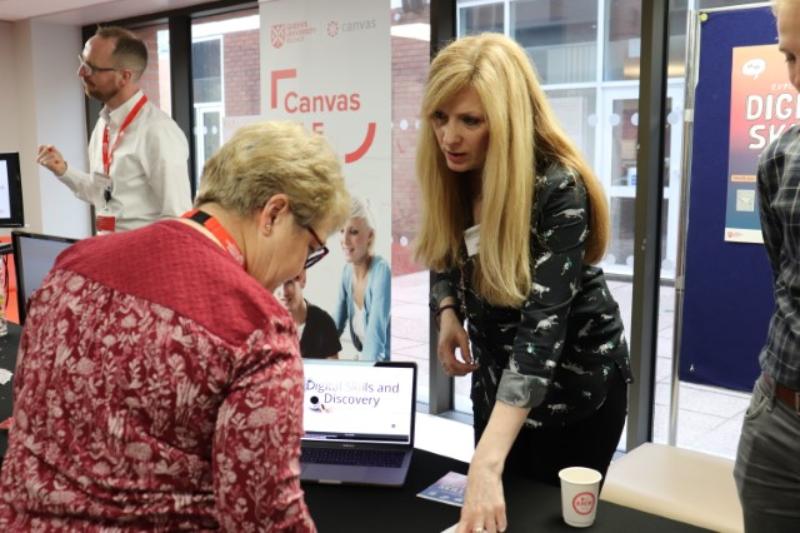
- Canvas
- Academic English Skills
- International Student Support
- AHSS: Preparing International Students for UK Higher Education
- EPS: Development and Implementation of a Student-Led, Staff Supported Blended Learning Approach for Communication Skills Development in International Students
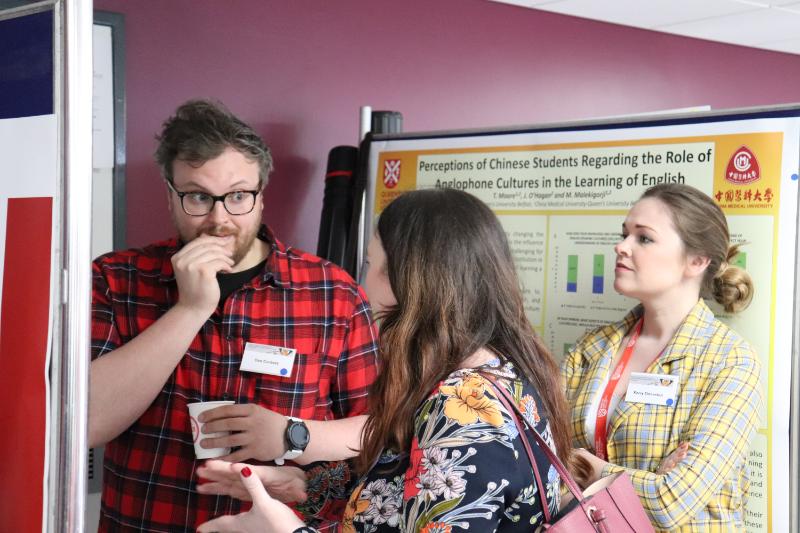
Posters exploring the conference themes will be available in the foyer throughout the day. During the registration and the coffee break, attendees will be able to chat with presenters and find out about their research and experiences.
All attendees are invited to vote for the best poster by placing the blue dot from their name badge onto the poster they find to be most interesting and engaging. Poster with the most votes gets a prize!
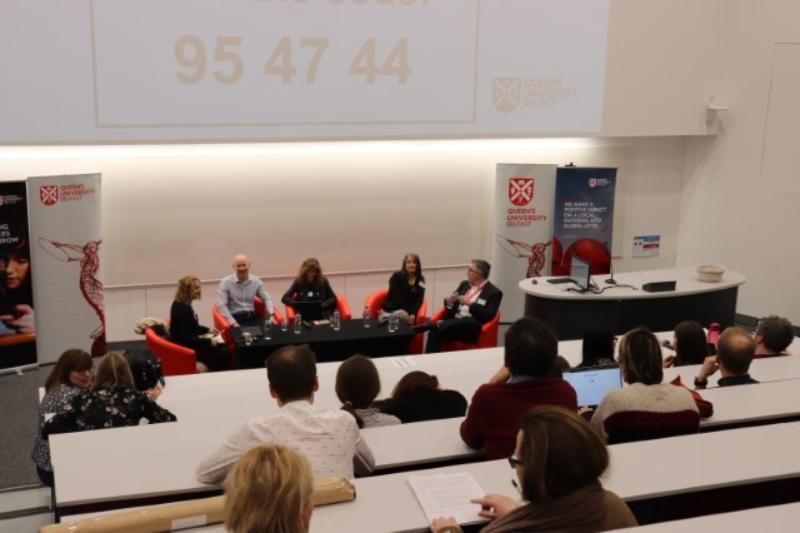
The panel session hosted by Dr Claire Dewhirst, Head of the Centre for Educational Development, will explore the issues further engaged with the conference themes. The panel will be attended by Dr Douglas Proctor (Director of UCD Global), Professor Karen Morrison (Dean of Education, School of Medicine, Dentistry and Biomedical Sciences), and Professor Michael Alcorn (Dean of Internationalisation, School of Art, English and Languages).
Audience questions will be facilitated by Mentimeter. Download the app for Android or Apple or simply go to menti.com.
